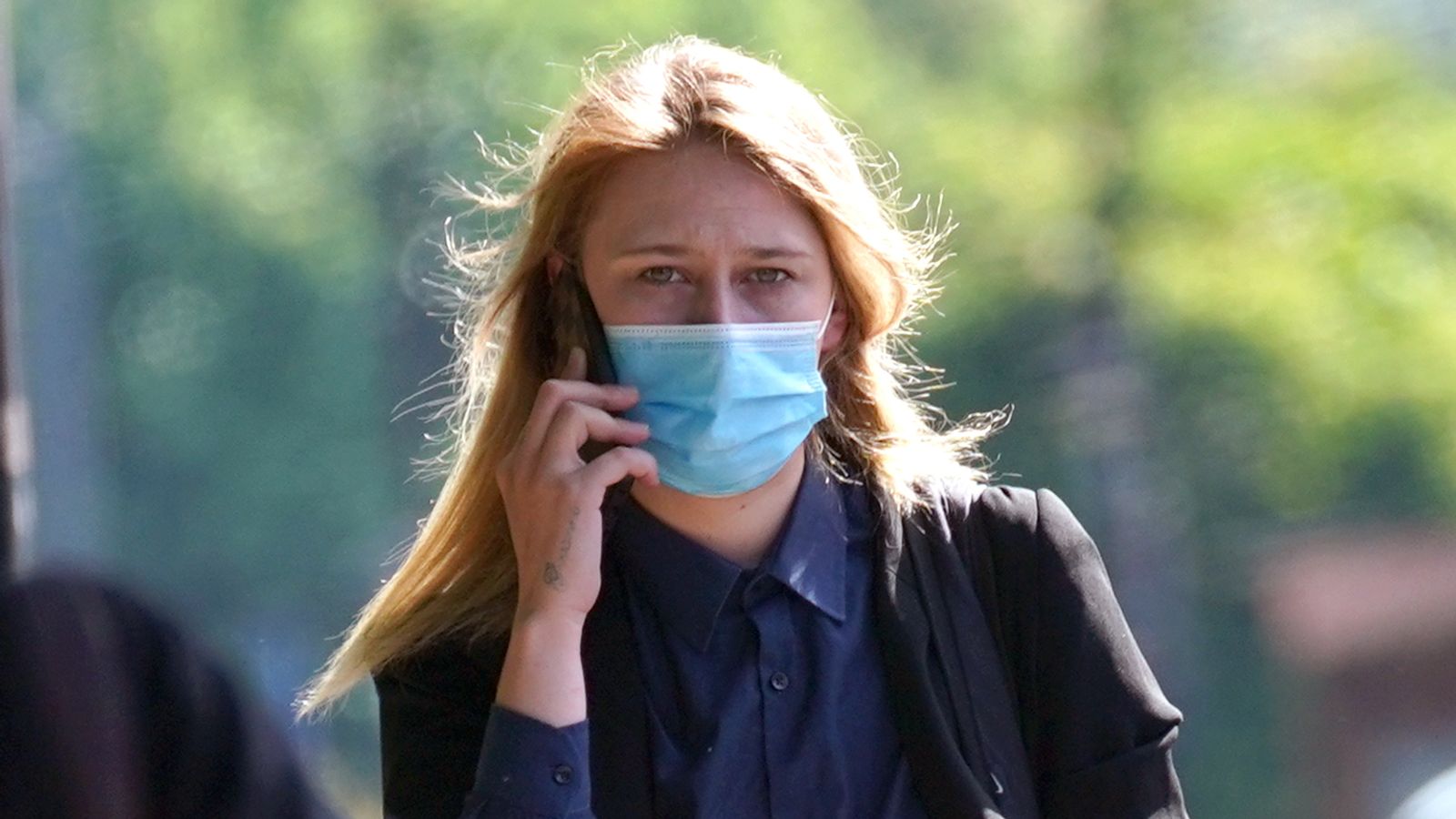
A woman has been found guilty of the infanticide of her 10-week-old daughter after social workers allowed her to go home from hospital despite medical staff warnings over her ability to care for the child.
Lauren Saint George, 25, is facing life in prison after daughter Lily-Mai George died from a serious head injury and also suffered 18 rib fractures, two leg fractures and severe bruising.
The baby’s father, Darren Hurrell, 25, had a murder charge dismissed by the judge but was convicted of cruelty and faces up to 10 years in jail.
Lily-Mai was born prematurely in November 2017, and was kept in Barnet Hospital, North London, where staff were concerned about a lack of bonding between mother and baby.
Jurors heard that four days after the birth, Saint George refused to visit her daughter on the ward, telling staff she was busy having her dinner.
When she finally agreed to visit, her midwives were horrified to see her standing with her back to the baby. Her parents would feed themselves before feeding Lily-Mai.
Saint George and Hurrell had been homeless and staff had tried to stop them taking Lily-Mai away from hospital, believing they were incapable of looking after her.
The mother had told staff that she hated the noises Lily-Mai made and wished she would “cry instead of groaning”.
Prosecutor Sally O’Neill QC told the Old Bailey jury: “Almost all of the professionals at the hospital were opposed to the baby being discharged into the parents’ care at home and had expressed their concerns about the parents’ ability to meet the baby’s emotional, developmental and physical needs on many occasions to the social services.”
Three referrals were made by hospital staff to social services expressing concern while Lily-Mai was still in hospital.
Alicia Jack, former social services manager at Enfield council, dismissed the first one as there was “no information” on their system about the family, the court was told.
She investigated and decided that no further action was needed regarding the second referral and rejected the third referral as the parents had moved, and their case had become the responsibility of Haringey Council.
Sithembile Dzingai, a locality manager who had been involved in discussions about Lily-Mai’s care, said: “There was no robust discharge plan to safeguard Lily-Mai.
“In my 12 years as a health visitor, I have never had such a feeling of anxiety about a case as I did about Lily-Mai being discharged.”
In early January 2018, the parents were provided accommodation in Belmont Road, North London, and after two months in hospital Lily-Mai was discharged into the couple’s care on 25 January.
Responsibility for Lily-Mai’s case had been taken over by Haringey Social Services, the same authority heavily criticised for its failings in the notorious Baby P and Victoria Climbié child abuse cases.
Lily-Mai died at Great Ormond Street Children’s Hospital on 2 February after her parents found her unresponsive at their home two days earlier.
Details of what happened during Lily-Mai’s final weeks were explored in great detail during the trial, largely through evidence from health and social workers.
Theresa Ferguson, two years into being a qualified social worker, was allocated Lily-Mai’s case, her first of this scale, on 12 January 2018. At the time, she said she had 36 open assessments and 41 allocated cases.
She told the court that she was given the case because the more senior member of the team could not take on any more work.
Ms Ferguson attended a meeting to discuss Lily-Mai’s discharge and care on 16 January at Barnet Hospital.
Midwife Marie Creighton said the social worker had a “generally disinterested attitude” when she first attended the meeting, adding: “I remember her…sauntering in with a miserable look on her face.
“She said she had been to Lauren and Darren’s flat and everything was fine, and she didn’t understand why she was called into the meeting, asking ‘Why are we even discussing her?’ She displayed a generally disinterested attitude.”
Ms Creighton went on to say that Ms Ferguson’s attitude changed as hospital staff explained their concerns.
Ms Ferguson attended a further discharge planning meeting on 22 January and two days later made a referral for a “legal gateway meeting”.
The day after taking this first step to intervene in Lily-Mai’s care, Ms Ferguson went on annual leave. She went away for four days on the day of the baby’s discharge on 25 January.
Ms Ferguson told the court she did not feel that proposed plans to protect Lily-Mai once she was discharged would safeguard her.
She said: “I was really worried about her going home. I was told that with the management there had been conversations and there was not a consideration for a placement at that point and Lily-Mai would be returning home.”
Duty social worker Muriel Caboste was allocated the case in the meantime and visited the family on 26 January. She said she left feeling there were no increased child protection issues, but noted that the parents were not following the feeding and medication chart.
No visits were made on 27, 28 or 29 January.
On 29 January the family went to see Darren Hurrell’s support worker, Anthony Monbelly, and he described Hurrell as a “very proud dad” and a “doting parent” compared with Saint George who he said had “little or no intervention” with the baby.
On 30 January, on her return from annual leave, Ms Ferguson visited the parents.
Prosecutor Ms O’Neill told jurors: “Lily-Mai’s skin had a mottled appearance and although Darren Hurrell told Ms Ferguson what they had been told to look out for by the hospital, which included the baby developing a pale appearance. He explained it by saying that the baby had a marble complexion.”
Health visitor Alberta Nyantaki also visited that day and said Saint George was “on the bed” for the whole of her visit and not “fully engaged”. She felt that Hurrell was the main carer and saw him give Lily-Mai cuddles and kisses.
The health visitor expressed “serious concerns” to Ms Ferguson after her visit, but was reassured by her that the threshold for a child care protection plan had been met, and the legal process had been started.
The social worker visited the family again the next day, 31 January, to tell the parents that they would need to go into a residential unit or Lily-Mai might be taken away from them. Residential placement meant professionals could observe the parents taking care of the baby.
Ms Ferguson said Saint George was “very despondent” on hearing the proposed plan and told her: “You want to take her, just take her, that’s fine.” But Hurrell was willing to go into the residential unit.
Ms Ferguson said: “I had quite a thorough conversation with Darren, making it clear that he was not to leave Lily-Mai with Lauren.
“He felt he would be able to call the police if he needed to and there would be options where he could go to stay if he needed to. I was confident that Darren was able to safeguard Lily-Mai.”
Four or five hours later, Saint George called 999 to report that her baby had stopped breathing. Lily-Mai died two days later.
Saint George told police she had tried to be a good mother, but had suffered from depression. She said she had never shaken or harmed Lily-Mai.
Hurrell said the baby’s injuries could have been caused accidentally: a bump in the bath, a sudden jolt in her pram on a bus or when he had grabbed her leg to stop her falling off a bed.
Neither of them gave evidence in court. They will be sentenced at a later date.
https://news.sky.com/story/woman-found-guilty-of-infanticide-of-10-week-old-daughter-who-was-discharged-into-her-care-against-medical-advice-12656821





